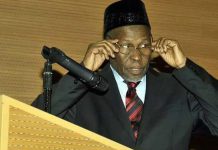By Abba Hamisu Sani
Africa-Press-Nigeria Nigeria, Africa’s largest oil producer and one of the world’s largest exporters, has barely any refining capacity for the estimated 1.6 billion barrels it produces daily. Its colonial-era refineries are in a moribund state, leaving the country with no choice but to export its crude oil and import refined petroleum products for daily use. Subsidies, amounting to billions of naira, are paid to fuel importers to make this happen.
The federal government had on Tuesday last week said methanol, a chemical additive, found in recently imported fuel exceeded Nigeria’s specification. The development has resulted in a shortage of petrol and queues reappearing in major cities including Abuja and Lagos.
Oil dependence has been linked with unusually high poverty rates, poor health care, high rates of child mortality, reduced expenditures on social services, poor educational performance. Besides, mineral dependence has strongly been correlated with income inequality Plus the recent contarmination of oil in Nigeria
Experts say this has has a serious impact on our wild lands and communities.
Drilling projects operate around the clock generating pollution, fueling climate change, disrupting wildlife and damaging public cars, and even lands that were set aside to benefit all people.
On Tuesday, the Nigerian Midstream and Downstream Petroleum Regulatory Authority said it found methanol above national specifications in the imported gasoline.
The regulator said efforts to remove the contaminated products from circulation caused long queues at many filling stations.
Methanol, in small amounts, has been capped for a regular gasoline additive.
But damages have already been done to a few automobiles in Lagos due to the high content of methanol in the imported fuel.
Public commentator Musa Waziri pray that all the vessels discharged the product, depots and the filling stations that received it should be identified and act accordingly.
He said two committees had been set up to address the technical and commercial issues, including the compensation.
He added that there were more than 3000 reported cases of issues with cars.
He added that what transfered at the end of the federal executive council (FEC) meeting, that the government would look into possible compensation for Nigerians whose automobiles had been damaged by the contaminated fuel to be actualised.
History with bad petrol
FOUL FUEL — GEN SANI ABACHA
(1997)
In 1997, an offensive odour premium motor spirit (PMS), also known as petrol, was imported into Nigeria during the regime of late General Sani Abacha.
The PMS was “foul fuel”, and it damaged car engines and caused health hazards.
The substandard fuel was reported to have been imported into the country.
PPMC later apologised for involving in the importation and distribution of the fuel.
BAD FUEL — UMAR MUSA YAR’ADUA (2008)
In February 2008, Oando delivered 33,000 metric tons of gasoline imported from Gunvor International BV Amsterdam, a commodity trading firm in Switzerland.
After several reports of damaging vehicles, Oando said in a press statement that the fuel was contaminated with ethanol — after confirming with the supplier.
The defunct Department of Petroleum Resources (DPR) passed the product despite regulatory tests and checks at the port — but did not test for ethanol, which is not part of the specification of Nigeria grade for gasoline.
AND NOW OFF-SPEC — MUHAMMAD BUHARI (2022)
In January 2022, petroleum product with methanol quantities above Nigeria’s specification was imported into the country.
Mele Kyari, the group managing director of the NNPC Ltd, said the methanol-blended petrol was imported into the country by a few suppliers through four premium motor Spirit cargoes under its Direct Sales Direct Purchase (DSDP) arrangement.
The DSDP arrangement is part of strategies by the NNPC to ensure a sustained supply of petroleum products in the country.
Kyari said the DSDP suppliers include MRS, Emadeb/Hyde/AY Maikifi/Brittania-U Consortium, Oando, Duke Oil, NNPC subsidiary.
He said all the suppliers of the contaminated petrol had been put on notice for “remedial action”.
Waziri lamented tht the fuel shortage which started last week in the commercial city of Lagos and administrative capital Abuja has caused long queues with few petrol stations selling the product.
Transport fares have gone up in several cities, curtailing services and forcing some residents and workers to walk long distances to their destinations.
Most homes in Nigeria also rely on petrol and diesel to power their generators as the public power supply is unreliable and prone to blackouts. Hence pray for decisive action to be taken.







